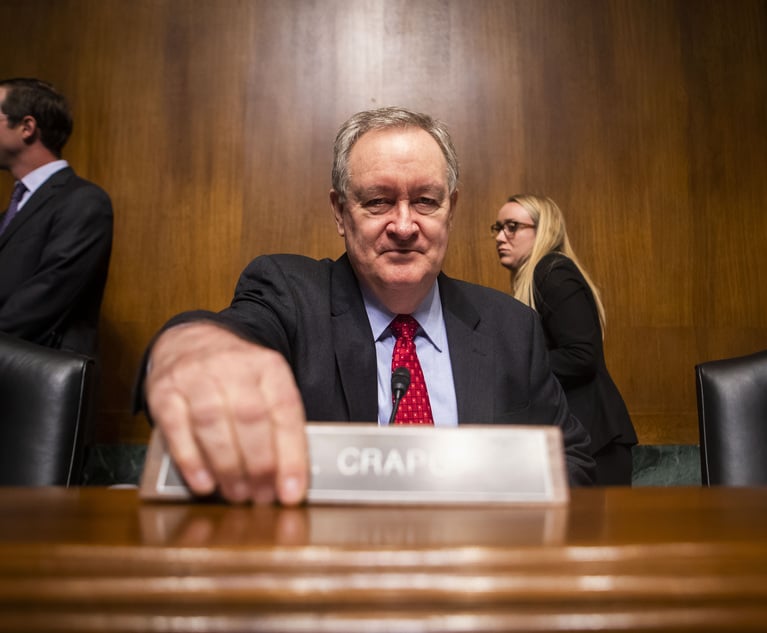ABA Panel Explores Space Force, Bringing Expectations Down to Earth
"Kinetic battles in outer space" may have to wait, but lawyers had plenty to say about the final frontier at the ABA's national security law conference in D.C. this week. Plus: The week's law firm moves and news around the capital.
November 02, 2018 at 02:28 PM
5 minute read
 Home of the universe's only known habitat for lawyers and lobbyists. (Image: Shutterstock.com)
Home of the universe's only known habitat for lawyers and lobbyists. (Image: Shutterstock.com)
Washington Wrap is a weekly look at the biggest legal industry news and Big Law moves shaping the legal business in Washington, D.C. Send tips and lateral moves to Ryan Lovelace at [email protected].
President Donald Trump's decision to create a Space Force as the sixth branch of the U.S. Armed Forces may have taken the public by surprise, but American Bar Association experts say it's been a long time coming.
Lawyers at the ABA's 28th annual review of national security law in Washington, D.C., indicated the world looks to be far, far away from the first galactic war for several reasons—not the least of which is the gravitational pull of governmental bureaucracy.
“Since all of us on this panel have been fielding questions from the media about the Space Force fighting aliens and all sorts of other things, it is perhaps a good time for me to just interject a couple of points,” said Jack Beard, moderator and associate professor of law at the University of Nebraska. “There's a lot of old things that people are now discovering for the first time, and there's also a lot of confusion about whether the Space Force represents some sort of change in policy.”
Beard said the Space Force idea was pushed by Rep. Mike Rogers, R-Alabama, long before the president adopted it, and he underlined that the agency would never get off the launching pad without Congress. He also noted the Pentagon's recommendations for a new space development agency to “streamline procurement” with a smirking chuckle, which drew a knowing laugh from a ballroom of lawyers and lobbyists at the Capitol Hilton, located on a K Street corner.
Meanwhile, you won't hear lawyers with space-related expertise complaining about all the chatter about science fiction becoming fact.
“The announcement of the Space Force was a real boon to me as a space lawyer,” said Melissa de Zwart, dean of Adelaide Law School in Australia and space law expert. “Media all over the world started reaching out to contact me and saying, 'What is this Space Force, what does it mean, and are we suddenly going to have a war in space?'”
De Zwart noted that military planners have hardly been ignoring space before now. “Space is militarized, it has been since the beginning,” she said. And she suggested change will come slowly. “As much as I am a particular fan of Darth Vader, we're not talking about having those sort of kinetic battles in outer space,” she said.
For now, it seems, any Space Force activities would be supporting national security activities under way on planet Earth. If we do ever enter a period of civil war with rebel spaceships striking from hidden bases against an evil Galactic Empire, we may not have or even need new rules of war.
“The bottom line is the law is there,” said U.S. Air Force Maj. Susan Trepczynski, National Air and Space Intelligence Center staff judge advocate. “There's not new law being developed. And, in fact, there's been some resistance to actually having any new law developed. It's hard to get new international law.”
Law Firm Moves, News, and Notes
Morrison & Foerster continued its lateral hiring spree with the addition of Vishal Mehta as a partner in the firm's antitrust group in Washington. He previously was a senior associate at Baker Botts, where he worked more than seven years.
Morrison & Foerster's antitrust group has added multiple new lawyers from government this year, most notably Lisa Phelan, formerly of Main Justice's Antitrust Division.
Hausfeld added Catherine Gill as global chief operating officer. Hausfeld's global headquarters are located in Washington, D.C., while Gill hails from Boston, where she was chief practice management officer at Goodwin Procter.
Eric McArthur, former deputy associate attorney general in the U.S. Department of Justice, has joined Sidley Austin in Washington.
McArthur, a former law clerk to U.S. Supreme Court Justice Clarence Thomas, is returning to Sidley Austin as partner. His practice will focus on representing clients in appellate court proceedings and trial court litigation. He spent nearly a decade at Sidley before entering the Justice Department in August 2017.
Cleary Gottlieb Steen & Hamilton elected 15 new partners and counsel this week, including a partner and a counsel in Washington, D.C.
Alexis Collins made partner focusing on complex civil litigation and criminal and regulatory enforcement matters in Washington. She previously was a deputy chief of the counterterrorism section of the U.S. Justice Department's National Security Division, and re-joined Cleary Gottlieb in 2015 after her turn in government.
Larry Malm now works as counsel at Cleary Gottlieb in Washington focusing on antitrust litigation. He joined the firm in 2010.
Baker McKenzie named A. Duane Webber, a partner in D.C., as its new North America chair. Webber led the firm's global tax practice until 2016 and was a member of the firm's executive committee before taking this new position.
Perkins Coie added Valerie Dahiya as a partner in Washington, D.C., from the U.S. Securities and Exchange Commission, where she was a branch chief in SEC's division of trading and markets.
At Perkins Coie, the Pacific Northwest native joined the blockchain and digital currency group. Prior to her experience as a branch chief, she also worked as senior counsel in the SEC's office of compliance inspections and examinations and as a regulatory analyst at the Financial Industry Regulatory Authority.
This content has been archived. It is available through our partners, LexisNexis® and Bloomberg Law.
To view this content, please continue to their sites.
Not a Lexis Subscriber?
Subscribe Now
Not a Bloomberg Law Subscriber?
Subscribe Now
NOT FOR REPRINT
© 2025 ALM Global, LLC, All Rights Reserved. Request academic re-use from www.copyright.com. All other uses, submit a request to [email protected]. For more information visit Asset & Logo Licensing.
You Might Like
View All
Am Law 200 Firms Announce Wave of D.C. Hires in White-Collar, Antitrust, Litigation Practices
3 minute read
Trump's RTO Mandate May Have Some Gov't Lawyers Polishing Their Resumes
5 minute read
Senator Plans to Reintroduce Bill to Split 9th Circuit
Trending Stories
- 1Data Disposition—Conquering the Seemingly Unscalable Mountain
- 2Who Are the Judges Assigned to Challenges to Trump’s Birthright Citizenship Order?
- 3Litigators of the Week: A Directed Verdict Win for Cisco in a West Texas Patent Case
- 4Litigator of the Week Runners-Up and Shout-Outs
- 5Womble Bond Becomes First Firm in UK to Roll Out AI Tool Firmwide
Who Got The Work
J. Brugh Lower of Gibbons has entered an appearance for industrial equipment supplier Devco Corporation in a pending trademark infringement lawsuit. The suit, accusing the defendant of selling knock-off Graco products, was filed Dec. 18 in New Jersey District Court by Rivkin Radler on behalf of Graco Inc. and Graco Minnesota. The case, assigned to U.S. District Judge Zahid N. Quraishi, is 3:24-cv-11294, Graco Inc. et al v. Devco Corporation.
Who Got The Work
Rebecca Maller-Stein and Kent A. Yalowitz of Arnold & Porter Kaye Scholer have entered their appearances for Hanaco Venture Capital and its executives, Lior Prosor and David Frankel, in a pending securities lawsuit. The action, filed on Dec. 24 in New York Southern District Court by Zell, Aron & Co. on behalf of Goldeneye Advisors, accuses the defendants of negligently and fraudulently managing the plaintiff's $1 million investment. The case, assigned to U.S. District Judge Vernon S. Broderick, is 1:24-cv-09918, Goldeneye Advisors, LLC v. Hanaco Venture Capital, Ltd. et al.
Who Got The Work
Attorneys from A&O Shearman has stepped in as defense counsel for Toronto-Dominion Bank and other defendants in a pending securities class action. The suit, filed Dec. 11 in New York Southern District Court by Bleichmar Fonti & Auld, accuses the defendants of concealing the bank's 'pervasive' deficiencies in regards to its compliance with the Bank Secrecy Act and the quality of its anti-money laundering controls. The case, assigned to U.S. District Judge Arun Subramanian, is 1:24-cv-09445, Gonzalez v. The Toronto-Dominion Bank et al.
Who Got The Work
Crown Castle International, a Pennsylvania company providing shared communications infrastructure, has turned to Luke D. Wolf of Gordon Rees Scully Mansukhani to fend off a pending breach-of-contract lawsuit. The court action, filed Nov. 25 in Michigan Eastern District Court by Hooper Hathaway PC on behalf of The Town Residences LLC, accuses Crown Castle of failing to transfer approximately $30,000 in utility payments from T-Mobile in breach of a roof-top lease and assignment agreement. The case, assigned to U.S. District Judge Susan K. Declercq, is 2:24-cv-13131, The Town Residences LLC v. T-Mobile US, Inc. et al.
Who Got The Work
Wilfred P. Coronato and Daniel M. Schwartz of McCarter & English have stepped in as defense counsel to Electrolux Home Products Inc. in a pending product liability lawsuit. The court action, filed Nov. 26 in New York Eastern District Court by Poulos Lopiccolo PC and Nagel Rice LLP on behalf of David Stern, alleges that the defendant's refrigerators’ drawers and shelving repeatedly break and fall apart within months after purchase. The case, assigned to U.S. District Judge Joan M. Azrack, is 2:24-cv-08204, Stern v. Electrolux Home Products, Inc.
Featured Firms
Law Offices of Gary Martin Hays & Associates, P.C.
(470) 294-1674
Law Offices of Mark E. Salomone
(857) 444-6468
Smith & Hassler
(713) 739-1250











